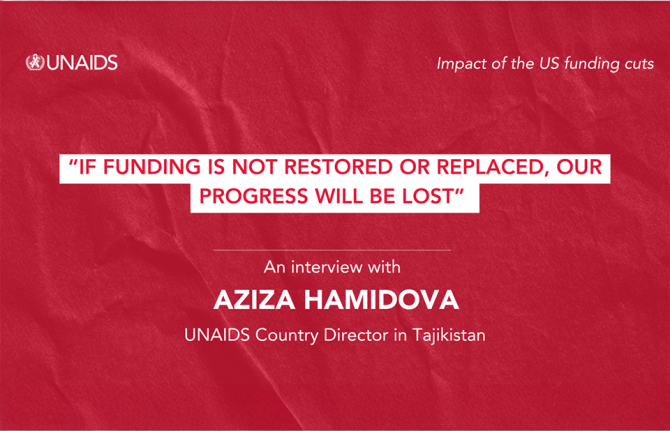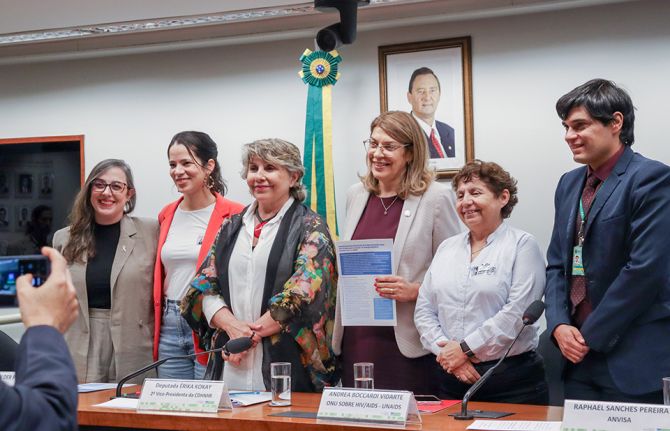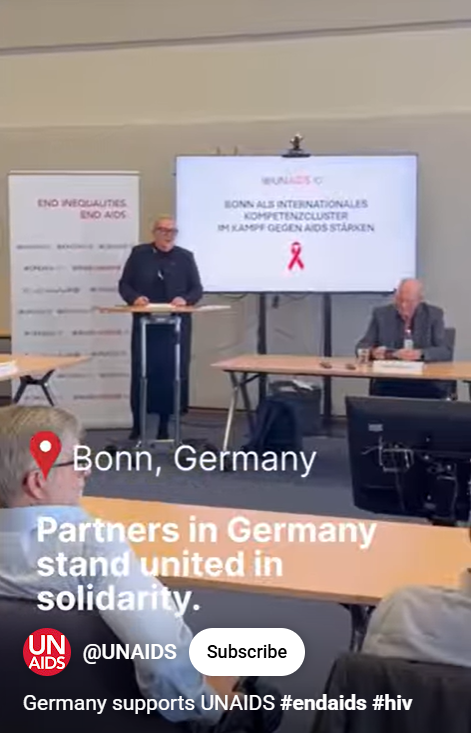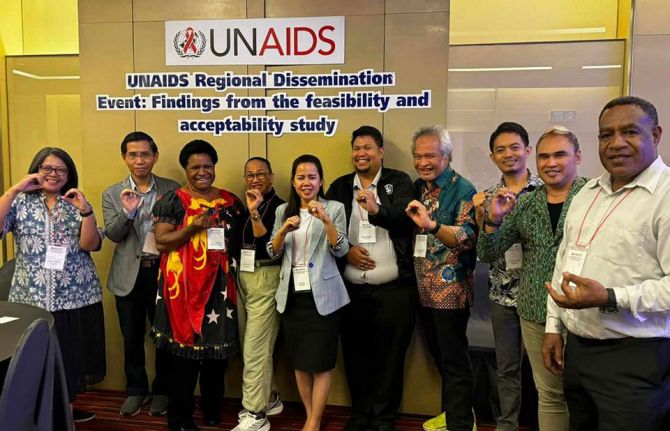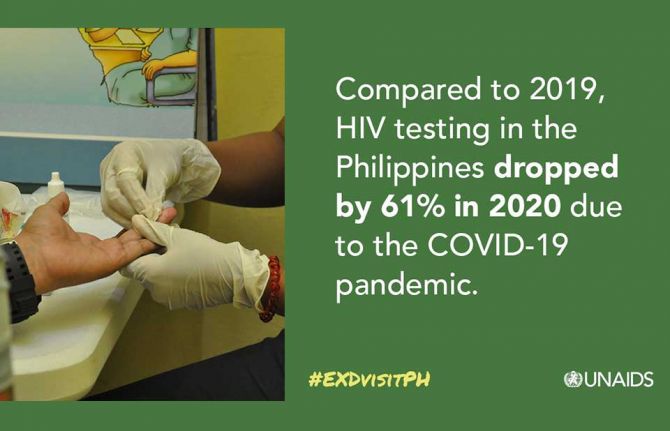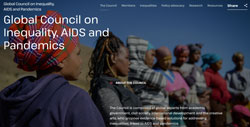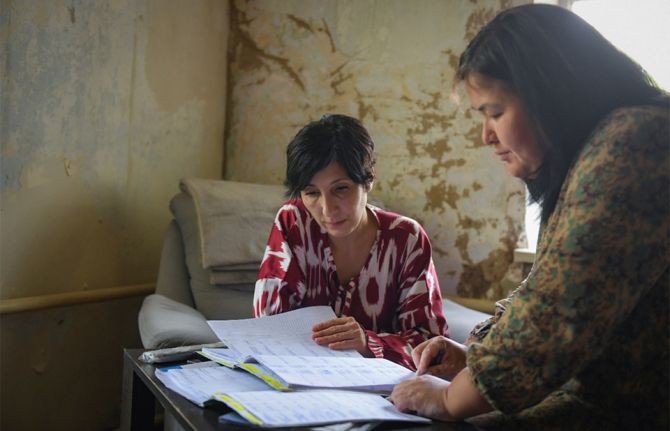
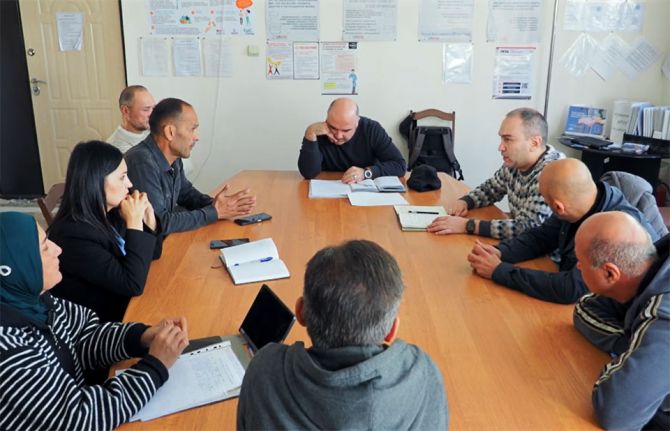
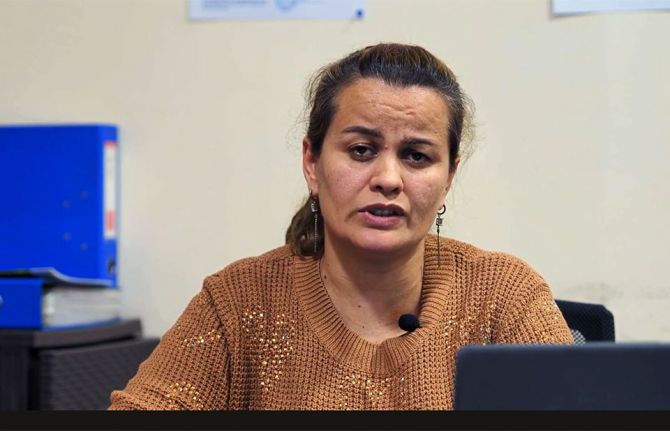
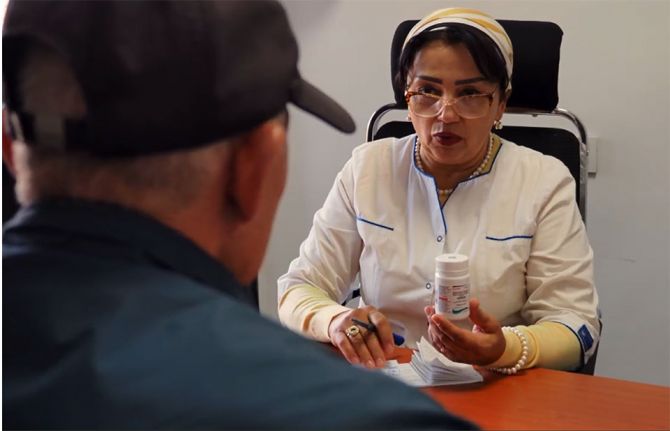
Feature Story
The impact of donor cuts on community-led responses in Tajikistan
08 December 2025
08 December 2025 08 December 2025Takhmina Haidarova and Pulod Jamalov are among the very few HIV activists in Tajikistan living openly with HIV. For years, they have been the public faces of courage—challenging stigma, supporting others and ensuring no one faces HIV alone. Through their organizations, the Tajikistan Network of Women Living with HIV and Spin Plus, they have built lifelines for people living with HIV and people from key populations, including people who use drugs.
Now, those lifelines are at risk of disappearing. Recent funding freezes and cuts to international HIV assistance threaten to close community-led programmes across the country. “People are panicking,” says Takhmina. “If our support services shut down, women affected by HIV, families with children living with HIV, and people from key populations will have nowhere to turn.”
Tajikistan is a small, mountainous, landlocked country in central Asia, bordered by Afghanistan, China, Kyrgyzstan and Uzbekistan. Despite economic growth, it remains the poorest country in the region, with nearly a third of its gross domestic product coming from remittances. It faces deep social and structural challenges—a fragile health system, restrictive laws, gender inequality, and powerful traditional and religious norms that fuel stigma and discrimination.
For people living with HIV, these challenges can be overwhelming. Nearly 97% of women living with HIV in Tajikistan conceal their HIV status, even from family members, and 64% report discrimination, including from health-care providers.
For Takhmina, the fight is personal. She acquired HIV from her husband, a labour migrant in the Russian Federation, and was rejected by the family after his death. “I did not even know HIV existed in Tajikistan,” she says. “I had no knowledge, no support, no one to turn to.” Now, through the Tajikistan Network of Women Living with HIV, she helps other women navigate the isolation she once faced.
“Community groups like ours are the only ones people trust,” says Pulod Jamalov, Director of Spin Plus. “We go where the system does not reach—into prisons, remote villages and migrant families. Without us, many people will simply be left behind.”
Until now, international partnerships have made real progress possible. HIV-related mortality has halved since 2020 in Tajikistan, and vertical transmission dropped to 0.8% in 2024, with only one such case recorded that year.
But this progress is fragile. About 60% of the HIV response in Tajikistan depends on international donors, of which about 20% was funded by the United States President’s Emergency Plan for AIDS Relief (PEPFAR) until January 2025. Around 37% of the national programme is now financed domestically, marking a step towards sustainability. The Government covers all costs for prevention of vertical HIV transmission, including HIV testing for pregnant women. In 2025, for the first time, the Government of Tajikistan allocated national funds to procure 10% of the country’s antiretroviral (ARV) medicines.
National authorities estimate that even a 10–20% reduction in funding could trigger a 135% increase in the number of new HIV infections and a 5% increase in mortality, erasing years of gains.
In January 2025, two major community health centres providing stigma-free care were closed, and outreach, testing and counselling stopped altogether. When these centres temporarily resumed their operations, they recorded a noticeable decline in the number of clients seeking or referred for services. Community-led monitoring, once a key accountability tool, has been completely discontinued.
Tajikistan has shown what is possible with targeted support. But unless donors, governments and international partners act quickly to protect community-led services, those gains will be reversed.
Watch: Funding cuts disrupt HIV response in Tajikistan
Region/country

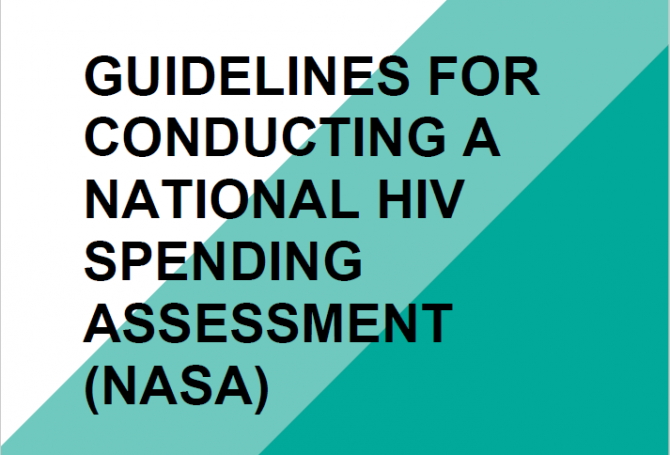
Feature Story
UNAIDS releases updated guidelines for conducting National AIDS Spending Assessments
14 November 2025
14 November 2025 14 November 2025UNAIDS is releasing an updated version of its guidelines for conducting National AIDS Spending Assessments (NASA). The guidelines are aimed at NASA implementers and HIV programme managers utilizing HIV expenditure data to influence budgetary, policy and programmatic decisions.
NASA is a comprehensive, systematic approach to tracking HIV expenditures and analyzing financial resources dedicated to the HIV response within a country. NASA results can identify which programmes and interventions are most underfunded and require prioritization, as well as those dependent on external sources and thus most vulnerable to external shocks. By providing this granular view, NASA data supports sustainability planning and integration into broader health financing systems, while also identifying potential inefficiencies and cost-saving opportunities, increasing evidence for allocative efficiency measures and fostering a performance-based financing culture aligned with value-for-money principles.
Importantly, the NASA approach allows for the tracking of resources being directed to, and used by, the community-led response, and for all community-based interventions. Without the detailed expenditures collected via NASA or through a similar approach, it would be difficult to monitor progress towards the global targets regarding community-leadership in the HIV response, as well as other country and global targets, including co-financing commitments.
These detailed expenditure data are critical to sustainability planning by providing an updated picture of the financial landscape which helps countries identify future trends and potential funding gaps, to inform their resource mobilization options and measure their progress towards sustainability of their HIV responses.
The NASA framework has been developed by UNAIDS in collaboration with partners and country stakeholders, evolving over more than two decades to provide a globally accepted, standardized and comparable approach to tracking the multisectoral resources invested in the HIV response. It aligns with the System of Health Accounts developed by the World Health Organization and is based on the triaxial framework of accounting (refer to figure below). NASA’s classification system allows for the detailed matching of the spending against the priorities outlined in countries’ national HIV strategic plans (NSPs) and the Global HIV Strategy. Since the late 2000s, over 80 countries have undertaken at least one NASA, with many countries undertaking assessments routinely, mostly in low and middle-income countries (LMICs). UNAIDS also offers an expanded range of resource tracking approaches to best suit country needs - including NASA-basic for resource constrained settings, requiring less time and fewer resources (typically 4–6 weeks) and NASA-plus for deeper dives into community-led response or TB tracking.
UNAIDS provides capacity building, technical tools and guidance, as well as technical support to countries for their routine expenditure data collection, analysis, and dissemination. UNAIDS also continues to support the strengthening of public expenditure systems, and HIV resource tracking within these, to improve governments’ ability to track and manage all their HIV and health-related expenditures, linking these to performance indicators, to achieve optimal outcomes with their available resources.
To promote transparency and accountability, UNAIDS and the Equitable Financing Practice synthesizes NASA and Global AIDS Monitoring (GAM) financial indicators making them publicly available and empowering stakeholders to interpret and advocate for improved resource allocation: https://hivfinancial.unaids.org/hivfinancialdashboards.html#
The findings from NASA will be instrumental in shaping the future direction of the HIV response in any given country. They will also support the broader goals of achieving universal access to HIV prevention, treatment, care and support services, and ultimately, in ending the AIDS epidemic as a public health threat by 2030.
Related resources


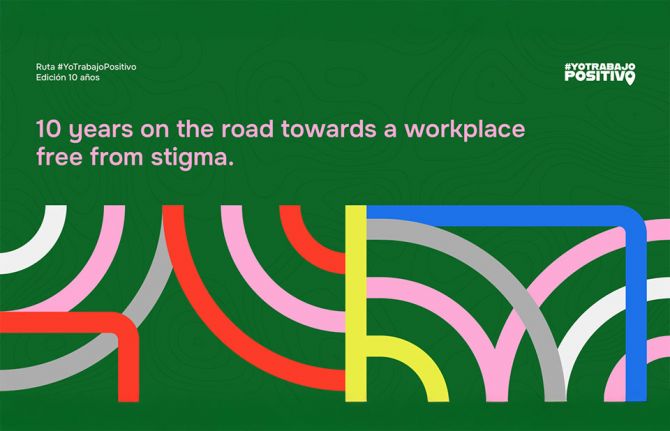
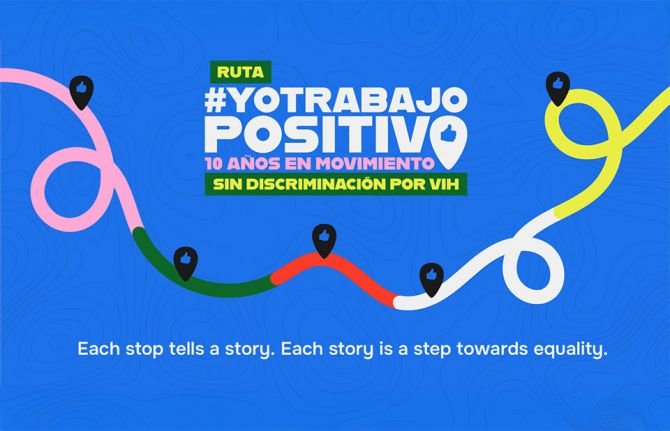
Feature Story
A decade of promoting workplace equality for people living with HIV in Spain
12 November 2025
12 November 2025 12 November 2025A nationwide campaign in Spain is raising awareness of the labour rights of people living with HIV, while strengthening the commitment of businesses, public administrations and civil society to combat stigma and discrimination.
Led by the non-profit association Trabajando en Positivo, the #YoTrabajoPositivo initiative is marking its tenth anniversary this year. For a decade, the initiative has travelled across Spanish cities raising awareness and advocating for the labour rights of people living with HIV, connecting companies, trade unions and institutions in this effort.
Medical advances have transformed the outlook for HIV. With timely diagnosis and proper treatment, people living with the virus can enjoy life expectancies and quality of life comparable to those of the general population. Nevertheless, stigma and discrimination remain real barriers to labour inclusion.
According to Spain’s Ministry of Health, 19% of the population report feeling uncomfortable at the idea of sharing a workplace with someone living with HIV. Similarly, the International Labour Organization’s Global Survey on HIV-related Discrimination in the World of Work (2021) revealed that a significant proportion of respondents (59.6%) supported measures that violate human rights, such as mandatory HIV testing for employment, highlighting the need to strengthen training and awareness. A further study, Experience of Stigma among People Living with HIV in Spain (Social Pact for Non-Discrimination and Equal Treatment Associated with HIV, 2024), reveals that many people with HIV still fear losing their jobs or being treated differently by colleagues if their status were known.
In this context, the initiative operates on three complementary fronts: providing evidence-based information, showcasing personal testimonies, and promoting good business practices. Together, these elements aim to dispel medical myths and transform workplace attitudes and organizational cultures.
Campaigns such as the #YoTrabajoPositivo Route play a vital role in spreading key messages that help to end stigma in workplaces including:
- HIV is not ordinarily transmitted in work environments.
- People living with HIV can perform any job with the same ability as anyone else.
- With effective treatment, people living with HIV can expect to live a normal lifespan and have full work capacity.
- There is no legal obligation to disclose HIV status in the workplace.
These messages are disseminated through public events, educational materials, and activities in public spaces, bridging the gap between scientific evidence and people's everyday experiences.
The initiative is also part of broader corporate social responsibility and equality promotion efforts in employment. Participation by companies in the Business Initiative Committed to HIV (Empresas Comprometidas con el VIH) has led to the development of internal policies that ensure HIV status does not negatively affect recruitment, retention or promotion processes. These policies also foster training and awareness among staff.
Over the past ten years, the #YoTrabajoPositivo initiative has created public spaces for dialogue on the right to work free from discrimination. It has brought scientific knowledge closer to the general public and fostered cross-sector collaboration.
Building on Spain’s commitment within the Global Partnership for Action to Eliminate All Forms of HIV-Related Stigma and Discrimination, the initiative shows how strong country leadership — combined with evidence, visibility, and collaboration — can transform attitudes and create fairer, more inclusive workplaces.
Campaign website
Region/country

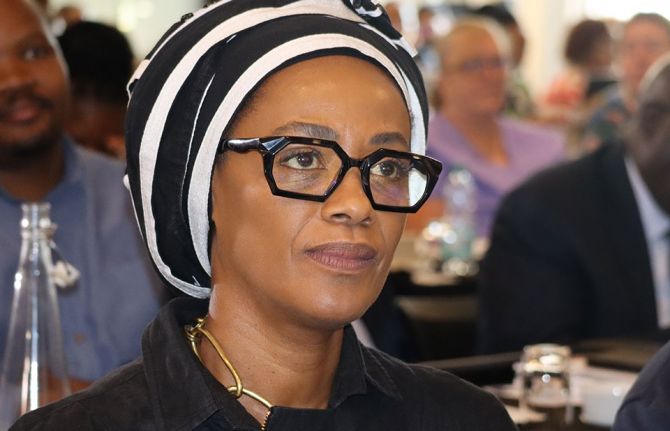

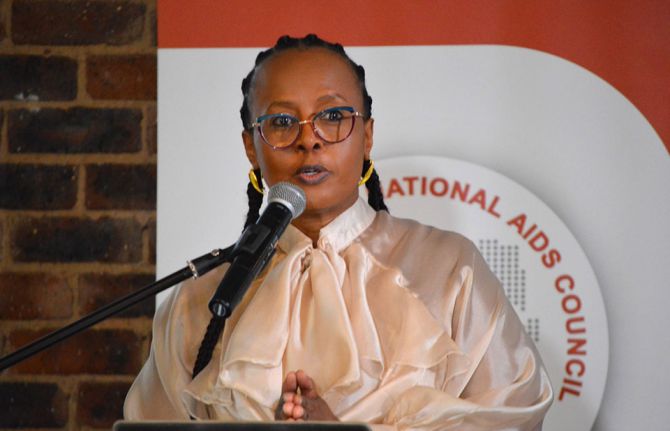
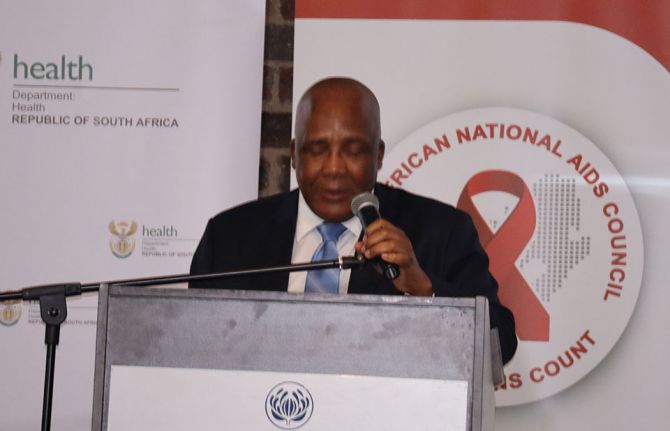
Feature Story
South Africa charts a new frontier by rolling out a twice-yearly injection which is almost 100% effective in preventing HIV
24 October 2025
24 October 2025 24 October 2025South Africa has taken a decisive step towards stopping new HIV infections. The South African National AIDS Council (SANAC) and the National Department of Health, in collaboration with UNAIDS, convened a two-day national meeting on access to a new, and potentially groundbreaking medicine (lenacapavir) which is set to be rolled out in South Africa in early 2026.
Minister of Health Dr Aaron Motsoaledi affirmed government’s commitment to make lenacapavir “a public good - accessible, affordable and locally produced”. He emphasised the importance of prioritising adolescent girls and young women. There are around 8 million people living with HIV in South Africa and every week around 1000 adolescent girls and young women become newly infected with HIV.
“The introduction of lenacapavir marks the beginning of a new phase in HIV prevention, one grounded in collaboration between government, communities, our partners like the Global Fund and UNAIDS and the private sector,” said Dr Motsoaledi. “This partnership must be accountable, transparent and inclusive if we are to achieve our national targets.”
South Africa is among nine countries globally selected to roll out the medicine under the Global Fund to Fight AIDS, TB and Malaria’s financial commitment to reach 2 million people across low- and middle-income countries.
“Science continues to offer us new tools, but innovation alone is not enough,” said Eva Kiwango, UNAIDS Country Director for South Africa. “Equity must follow. Communities, especially young women and key populations, have waited too long for HIV prevention they can trust and use with dignity.”
Through a US$ 29 million grant, South Africa will receive enough medicine to provide HIV prevention to 450 000 people at high risk of HIV during a rollout in 23 high-incidence districts across six provinces. The aim is to reach adolescent girls, young women, sex workers, men who have sex with men, people who use drugs and other at risk populations.
“We are not gathered merely to discuss a medicine, but to reaffirm our collective commitment to justice and equality,” said Steve Letsike, Deputy Minister for Women, Youth and People living with Disabilities. “No young woman, no queer person, no person with a disability must be left behind in the promise of HIV prevention.”
Across both days, a common message resonated: partnership is South Africa’s greatest strength. Dr Thembisile Xulu, SANAC CEO, called for unity of purpose noting, “We must move from conversation to coordination, and from coordination to action.”
Yvette Raphael, Co-founder of the Advocacy for Prevention of HIV and AIDS in South Africa emphasised the need to take the message to communities, saying, “Civil society must be given the tools for demand creation to provide research literacy in the way that we and communities understand.”
The evidence and the promise
Presenting findings from the PURPOSE 1 and 2 trials, Professor Linda-Gail Bekker, CEO of the Desmond Tutu Health Foundation reported 100 % efficacy among cisgender women and 96% efficacy among men, transgender and non-binary participants. She highlighted that long-acting prevention tools such as lenacapavir expand choice, strengthen agency, and promote equity, offering new hope to those who need discreet and durable protection.
Professor Helen Rees, from WITS RHI, emphasised the issue of misinformation and disinformation as South Africa prepares to roll out lenacapavir next year. She said that all stakeholders, “Must underscore the importance of science because if there is mistrust in science, people will not trust new products. As we roll out lenacapavir we must have our ears on the ground for misinformation and disinformation.”
Gilead Sciences, developer of lenacapavir, represented by Country Manager, Wendy Cupido affirmed its commitment to ongoing dialogue and partnership with the Government of South Africa and stakeholders to ensure affordable, equitable access. She noted that the manufacturer of lenacapavir Gilead remains ready to engage with the country and partners as they explore local manufacturing readiness.
Speaking during a panel discussion, young Shout Out Now ambassador, Lerato explained the impact of missing one day of oral PrEP means putting yourself at risk of acquiring HIV. She said, “I am looking forward to lenacapavir to reduce my monthly visits to the clinic to access medication and all the relevant screenings to keep myself safe from HIV. It will make my life easier.”
Dr Yogan Pillay, Director HIV and TB delivery at the Gates Foundation underlined how collaboration is transforming affordability. Recent landmark agreements secured by Unitaid, CHAI, Wits RHI and Gates will make generic lenacapavir available at a cost of US$ 40 a year in 120 low- and middle-income countries starting in 2027. “Sustainability isn’t imported -it’s built,” he said, noting the importance of local manufacturing and data-driven delivery.
The meeting entitled Lenacapavir Access and Sustainability was held in Johannesburg on 14 and 15 October, 2025. Over 100 participants participated in person and 130 joined virtually. The consultation marked the launch of the rollout of Lenacapavir in South Africa which is set to start in 2026.
Region/country

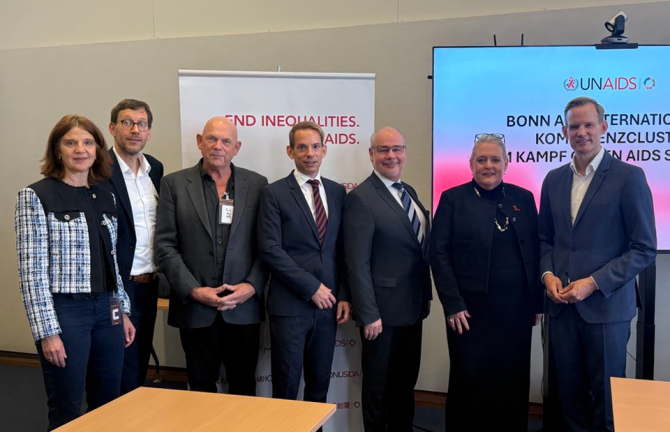
Feature Story
Germany steps up support to UNAIDS amidst HIV funding crisis
23 October 2025
23 October 2025 23 October 2025As global HIV funding faces mounting pressure, Germany is stepping up its support to ensure the world remains on track to end AIDS by 2030. As donors reduce contributions, UNAIDS and its partners are facing growing challenges in maintaining access to life-saving HIV prevention and treatment services worldwide. Germany’s leadership comes at a crucial time.
At the World Health Summit last week in Berlin, Germany announced an additional €2.5 million in core funding to UNAIDS, bringing its total core contribution for 2025 to €5.5 million. Germany also announced a €1 billion commitment to the Global Fund to Fight AIDS, TB and Malaria’s Eighth Replenishment.
Germany has long been one of UNAIDS’ most steadfast and trusted partners. With the support of the Federal Foreign Office, UNAIDS has established a major hub in Bonn as part of a broader transformation to make the organization more effective, efficient, and fit for purpose. The Federal Foreign Office has pledged an additional €500,000 to support the relocation of additional staff from Geneva to Bonn, as well as a €1.2 million contribution to strengthen UNAIDS’ work with LGBTIQ+ communities worldwide.
At an event held at the United Nations Campus in Bonn this week, around 30 representatives from the German Federal Government, academia, civil society, AIDS activists, and international development and global health organizations came together to explore how to further strengthen the partnership between UNAIDS and Germany and to reinforce Bonn’s role as a key global hub for health and HIV.
“Crisis often creates opportunities for change,” said Christine Stegling, UNAIDS Deputy Executive Director. “As UNAIDS redefines its structure to better serve the global AIDS response, Germany’s partnership is of central importance. It sends a powerful message when, at a time when others are stepping back, Germany steps forward—affirming that ending AIDS remains a political priority.”
The event also featured remarks by Georg Kippels, Parliamentary State Secretary of the Federal Ministry of health, who emphasized Germany’s founding role in establishing UNAIDS in 1996 and reaffirmed the Federal Government’s long-term support. “UNAIDS reaches people who are often left behind—people who use drugs, those facing discrimination and young women. Germany will continue to stand by UNAIDS to ensure that no one is excluded from the global AIDS response,” said Mr Kippels.
A subsequent panel discussion opened with a statement by Hendrik Streeck in his triple role as local Member of Parliament from Bonn, Director of the Institute of Virology at the University Hospital Bonn and Federal Commissioner on Drugs. Panelists Paul Zubeil, Federal Ministry of Health, Peter Wiessner, Action Alliance against AIDS and Anne von Fallois, Chief Executive Officer, German AIDS Foundation highlighted Germany’s leadership in the global response, the vital role of civil society, and new opportunities for collaboration within Bonn’s expanding AIDS competence cluster.
Paul Zubeil left no doubt that UNAIDS is a critical actor as the global context of the AIDS response is radically shifting: “The Federal Ministry of Health is working closely with UNAIDS and has seen it manouevering the new realities in a proficient manner. UNAIDS can support domestic stakeholders in high-burden settings to take more ownership while ensuring that key populations remain at the centre o the response. "The fundamental values of UNAIDS’ approach are based on scientific evidence, human rights, and the inclusion of key populations,” said Mr Wiessner. “UNAIDS brings everyone to the same table—governments, civil society, and affected communities—and that’s what makes it unique and invaluable.”
Hendrik Streeck underlined that medical innovation remains key to ending AIDS, citing the example of Lenacapavir, a new injectable drug that can protect a person from HIV infection for an entire year. “The Bonn research ecosystem is ideally placed to contribute to such breakthroughs,” he noted.
Anne von Fallois emphasized the importance of continued collaboration between international organizations and civil society actors based in Bonn. “UNAIDS plays an essential role in connecting us. In Bonn and across Germany, we must continue working together to ensure that HIV remains a priority on the global health agenda. UNAIDS provides us with information, guidance, and context for our work—and reminds all of us that the fight against HIV is not over yet.”
This year, UNAIDS is expanding its staff presence in Bonn to strengthen collaboration with the city’s leading global health research institutions and UN organizations. Once the current restructuring is complete, Bonn will become UNAIDS’ largest hub, underscoring its growing importance as a centre for innovation, research, and partnership in the global AIDS response.

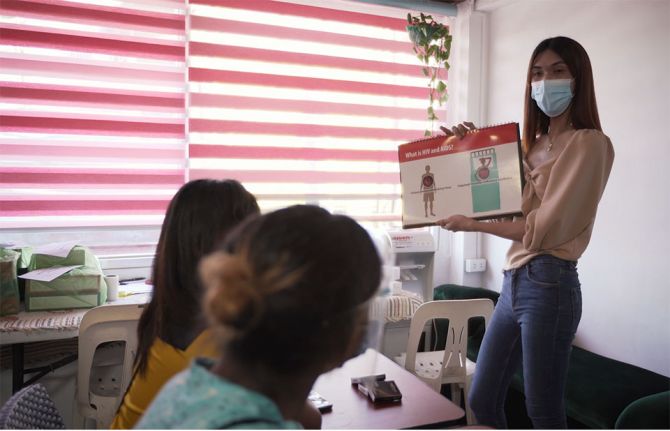
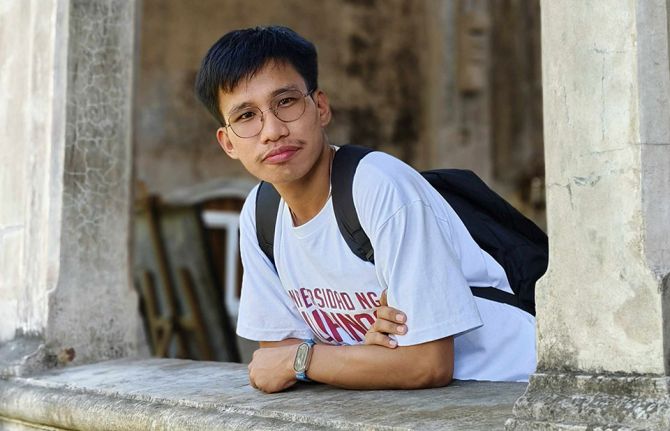
Feature Story
Breaking barriers, saving lives: how UNAIDS has helped drafting Philippines’ landmark HIV laws
13 October 2025
13 October 2025 13 October 2025At 17, Krang Martir stood in a clinic, alone and scared. He had decided to get tested for HIV after suspecting he may have been exposed when a trusted friend abused and raped him. But he hit a wall: the law at the time did not allow minors to access HIV services without parental consent – and he did not feel comfortable disclosing details to his parents. At that moment, even as he tried to take control of his health, the law made him wait. That wait could have cost him everything.
Thankfully, a clinic worker who empathized with him helped him get tested, which opened the door to treatment.
Today, young people in Krang’s situation no longer face that same barrier. In 2018, the Philippines passed a landmark HIV law - Republic Act 11166 - allowing people as young as 15 to access HIV testing and treatment without parental consent. The law didn’t just change policy. It saved lives. And it opened the door for a more inclusive, compassionate HIV response.
“Through RA 11166, we didn’t just protect all Filipinos, from womb to tomb, against the threat of HIV, we also provided support to the children, families, partners, and support groups of people living with HIV”, said Elena Felix, co-founder of the Association of Positive Women Advocates, Inc.
For more than a decade leading up to the law’s passage, UNAIDS worked alongside communities, government agencies, and civil society organizations to make this possible. Behind the scenes, it brought in global guidance, supported consultations, helped build consensus across sectors, and ensured that those most affected were leading the conversation.
“This wasn’t a one-year push,” said Bai Bagasao, UNAIDS Philippines Country Director from 2008 to 2016. “It took over a decade of advocacy, technical inputs, and persistent work with civil society, lawmakers, and health officials.”
The story of RA 11166 begins long before its enactment. In 1998, the Philippine AIDS Prevention and Control Act, also known as RA 8504, became the country’s first comprehensive legal response to HIV – also developed with support from UNAIDS. At the time, it was a progressive step to strengthen public awareness, establish the Philippines National AIDS Council, and enshrine into law protections for people living with HIV.
Geoffrey Manthey, the first UNAIDS Country Director in the Philippines, was directly involved in the advocacy for RA 8504. “Back then, passing the law was about breaking the silence,” he recalled. “We needed a framework that recognized HIV as a public health and human rights issue, not just a medical one. It was about protecting people who were most at risk, even when talking about HIV was still taboo.”
But as the years passed, the epidemic evolved. The virus began to spread rapidly among young Filipinos, especially among young men who have sex with men. Yet legal restrictions kept them from getting timely help.
Gerard Belimac, who once led the Department of Health’s National HIV and AIDS Program, remembers those years as a race against time. “We saw the numbers rising, especially among youth, but the law had not caught up. It didn’t reflect the realities on the ground,” he said. Many young people, afraid of rejection or not ready to talk to their families, avoided testing altogether. The result was late diagnosis, missed treatment, and sometimes lives lost.
RA 11166 was signed into law in December 2018. It did more than address the consent issue. The law streamlined testing and treatment procedures, embedded HIV education into schools, and updated national guidelines to reflect the latest global standards. It also strengthened the approach to view HIV not just as a medical condition, but also as a rights issue.
That shift continues today. In 2022 and 2023 alone, UNAIDS and its UN partners supported wide-reaching reforms. PrEP - a preventive medication - was added to the national drug formulary, enabling procurement through government channels. Over 50,000 people from key populations accessed it. PhilHealth, the national insurance provider, raised its HIV treatment reimbursement rates by 95%. And testing and treatment are expanding into new spaces, with faster turnaround times and better community-based systems.
“Laws don’t change things overnight,” said Louie Ocampo, UNAIDS Philippines Country Director. “But they create space. They legitimize what people have already been doing on the ground - and that makes a huge difference.”
Ms Felix sees the law as a symbol of how far the country has come - and how far it still has to go. “This law gave us space to be heard,” she said. “To be seen not just as patients, but as advocates.”
It’s a perspective echoed by Malou Quintos, UNAIDS Philippines’ Community-Led Responses Adviser. “We’ve moved from fear to hope. But the most powerful shift has been that people living with HIV are now leading the conversation.”
For Krang, now 26, the transformation is personal. He now speaks publicly about his experience and works to support young people who feel lost like he once did. “I wish I had this kind of law back then,” he said. “But I’m grateful it’s here now.”
Despite major successes, the work continues. Stigma remains. Many Filipinos still face barriers to care. But the path is clearer now - and more inclusive. With the United Nations celebrating 80 years of global service, the Philippines HIV response offers a striking example of how international cooperation and partnership, grounded in local realities, can deliver long-term results.
As Krang put it, “This law doesn’t just protect us, it tells us we matter. And that’s something no one can take away.”
Originally published in Breaking barriers, saving lives: how UNAIDS has helped drafting Philippines’ landmark HIV laws | United Nations in Philippines
Region/country

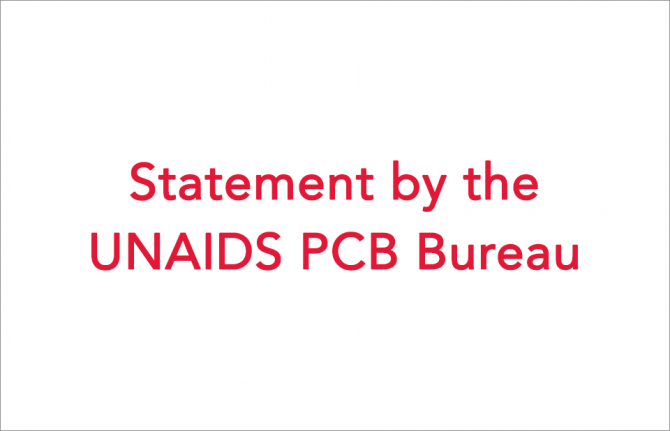
Feature Story
Statement by the UNAIDS Programme Coordinating Board Bureau
25 September 2025
25 September 2025 25 September 2025GENEVA, 25 September 2025— Following the publication of the UN80 Initiative progress report on 18 September 2025, the Bureau of the UNAIDS Programme Coordinating Board (PCB Bureau) convened an extraordinary meeting on 22 September to discuss the report’s proposal related to UNAIDS.
The PCB Bureau—comprising Brazil (Chair), the Netherlands (Vice-Chair), Kenya (Rapporteur), the NGO Delegation, and the International Labour Organization (ILO) as Chair of the Committee of Cosponsoring Organizations (CCO)—reaffirmed the decisions taken by the UNAIDS Board and the UN Economic and Social Council (ECOSOC) in June and July 2025, which provide a clear, two-phase roadmap for the transformation of UNAIDS. As these are consensus decisions by the governing bodies of the UNAIDS Joint Programme, the Bureau believes they are critical elements of any next steps in UN80 deliberations as they pertain to UNAIDS.
The decisions of the UNAIDS Board in June 2025 have been based on an inclusive process involving all stakeholders in the AIDS response and initiated by the UNAIDS Board in December 2023 at its 53rd meeting, where the Board requested the UNAIDS Executive Director and the CCO to revisit the operating model.
To that end, the UNAIDS Executive Director and the ILO Director General, on behalf of the Joint Programme, convened a High-Level Panel of diverse stakeholders in the HIV response, which made a set of recommendations to the Joint Programme.
On the basis of these recommendations, the UNAIDS Executive Director and the Director-General of the ILO presented a revised operating model to the Board for its consideration and the Board made the following decisions:
- Welcomes the work and recommendations of the High-Level Panel on a resilient and fit-for-purpose UNAIDS Joint Programme in the context of the sustainability of the HIV response;
- Takes note of the Executive Director and CCO’s Report on the recommendations for revisions to the Joint Programme operating model (UNAIDS/PCB(56)25.15);
- Welcomes the clear articulation of the Secretariat’s four core functions as (1) leadership and advocacy; (2) convening and coordination; (3) accountability through data, targets, strategy; and (4) community engagement, while requesting that actions to address inequalities are integrated across these four priorities and recalling the guiding principles of UNAIDS’ work;
- Endorses the revised operating model of the Joint Programme, as set out in this report (UNAIDS/PCB(56)25.15), noting that additional decisions will be taken on the operating model at the Special Session of the PCB in October 2025 and subsequent PCB meetings in line with future decisions of the UN80 Initiative.
- Requests the Executive Director to provide regular updates on the operationalization of the revised operating model starting at the 57th PCB meeting in December 2025;
- Requests the Executive Director, to define a review process of the revised operating model by the 57th PCB in December 2025, in consultation with the Cosponsors and PCB stakeholders, and undertake that review by June 2027 at the latest to inform the PCB’s decision making, subject to ECOSOC decisions, on the further transition of the Joint Programme within the wider UN system to sustain global progress towards ending AIDS as a public health threat.
In July, these decisions were formally noted by ECOSOC in consensus Resolution E/RES/2025/20 on the Joint Programme (https://docs.un.org/en/E/RES/2025/20).
During its discussions on 22 September, Bureau members highlighted the importance of protecting the integrity of the reform process underway and avoiding further disruption to the HIV response, expressing concern that the UN80 progress report did not reflect the recent Board and ECOSOC decisions, leading to confusion among stakeholders, particularly civil society and donors.
The Bureau recalled that the proposals in the UN80 report are non-binding and that it is the responsibility of the governing bodies to determine the way forward, as emphasized by the Secretary-General. In this context, the Bureau has added an agenda item on implementation of the UNAIDS revised operating model and UN80 to the Special Session of the PCB on 8 October 2025, before the UNAIDS Board considers the 2026 Workplan and Budget.
The PCB Bureau acknowledges UNAIDS' commitment to a transparent, inclusive and responsible transformation, adhering to the decisions of its governing bodies, aligned with the broader objectives of UN80 reform and towards achieving the goal of ending AIDS as a public health threat by 2030.

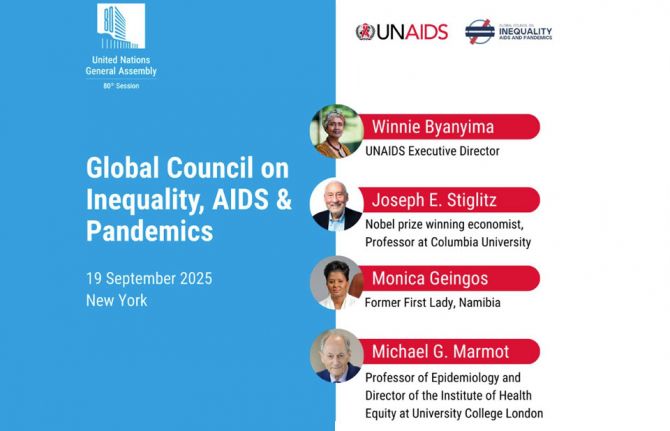
Feature Story
Ahead of UNGA, global experts investigate how inequalities are making the world more vulnerable to pandemics
22 September 2025
22 September 2025 22 September 2025In advance of the UN General Assembly High-Level Meetings, a group of experts co-chaired by Nobel prize winning economist Joe Stiglitz, former First Lady of Namibia Monica Geingos, and Director of the Institute of Health Equity Sir Michael Marmot met to review how inequality gaps within and between countries are impacting global health security. Economists, public health experts, and current and former government leaders from around the world took part in the meeting of the Global Council on Inequality, AIDS and Pandemics.
The Council convened in New York at a time of growing concern that governance, economic, and social crises are undermining the world’s capacity to respond to current and future disease outbreaks. Council members will meet with world leaders gathered this week at the UNGA.
A synthesis of the findings gathered over two years by the Council will be published in November ahead of the G20. It will cover issues including the debt crisis, social determinants, access to pandemic products, and the struggling role of community organizations in the current global environment.
“Deepening inequalities are dangerous,” said UNAIDS Executive Director Winnie Byanyima, who convened the Council. “When we set up this Council two years ago, it was with a clear vision: to collect the evidence, advocate for the policies, and secure the action needed to address the inequalities that make disease outbreaks more frequent, that accelerate the spread of disease and that intensify and prolong the impacts of pandemics.”
“When global rules leave some countries unable to protect their populations from current or future pandemics, that does not only endanger people in those countries, it endangers people in all countries,” said Joe Stiglitz.
“The need to tackle inequalities worldwide is not only a moral responsibility. It is essential for ensuring a safe and secure world. Tackling inequality, protecting everyone’s rights, is in everyone’s interests,” said Monica Geingos.
“None of the inequalities that threaten public health are immutable. They can all be tackled through proven policies and investments. Inequalities can be overcome if leaders follow the evidence,” said Michael Marmot.
Find out more about the work of the Global Council on Inequality, AIDS, and Pandemics at https://www.inequalitycouncil.org

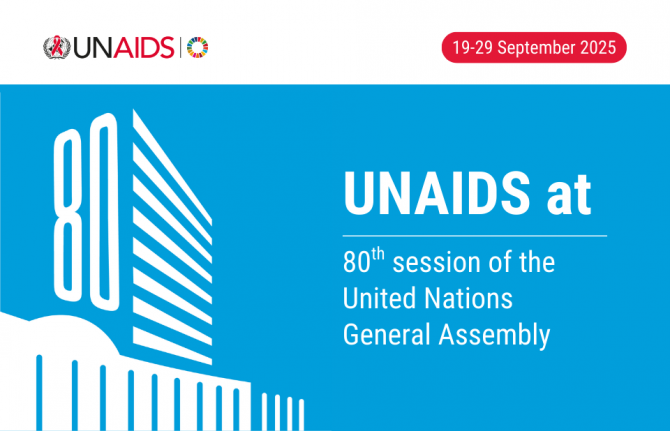
Feature Story
UNAIDS at the 80th United Nations General Assembly
17 September 2025
17 September 2025 17 September 2025At the 80th session of the UN General Assembly (UNGA) global leaders will convene to build consensus and confront complex global challenges. The 80th Session will be presided by Ms Annalena Baerbock of Germany. Her vision: “Better Together - Joining efforts to forge a better future for all."
UNAIDS, as the steward of the global HIV response and a long-standing advocate for people-centered and inclusive approaches, will reaffirm how the voices of communities remain central to the dialogues at the UNGA. High-Level Week offers a critical platform to advocate for integrated, multisectoral approaches that advance health, rights, and resilience.
THREE KEY MESSAGES UNAIDS WILL BRING TO #UNGA80
REVERSE THE FUNDING CUTS AND EXPAND ACCES TO HIV MEDICINES
Massive cuts to HIV funding are putting lives in jeopardy. The 40 million people living with HIV need antiretroviral treatment yet cuts to funding are reducing access – putting millions of lives in danger. This must be reversed particularly as breakthrough new medicines are coming to market that can prevent transmission of HIV with injections just twice a year. Research shows the medicine – lenacapavir - can be made for just US$ 25 per person per year, but the current cost is US$ 28,000 – unaffordable and out of reach for the people who need it most including young women and girls in sub-Saharan Africa. We will be advocating for access to medicines for all!
RELATED EVENTS:
Friday 19 September 2025 - 09:00 – 17:30 (ET)
Global Council on Inequality, AIDS and Pandemics, convened by UNAIDS
This session will provide an overview of research showing that inequality is driving pandemics; pandemics increase inequality; and that we are more vulnerable because of it.
Tuesday 23 September 09:00 – 11:00 (ET)
G20 Social Summit Side Event "Advancing Inclusive Growth, Social Justice and Human - Centered Development" hosted by South Africa in partnership with UNDP and Open Society Foundation
This event will explore how the G20 can lead inclusive and just responses to global crises, aligned with South Africa’s G20 priorities on climate resilience, debt sustainability, a just energy transition, and the governance of critical minerals. It will also highlight the role of the G20 Social Summit as a platform for inclusive engagement with youth, civil society, women, labour, and grassroots movements.
Tuesday 23 September 16:00 – 17:00 (ET)
From Accra to the World - Launching the High-Level Panel on Reimagining Global Health Governance
H.E. President John Dramani Mahama, President of the Republic of Ghana, will host a Presidential Side Event to formally announce and launch a bold new High-Level Panel on Reimagining the Global Health Governance.
Wednesday 24 September 07:00 – 09:15 (ET)
Annual Prayer Breakfast: Protecting Every Child, Upholding Every Life
Wednesday 24 September 2025 - 09:00 – 11:00 AM (ET)
Equity and integration: Reshaping health systems through people-centred primary care – a call for convergence and co-investment
Leaders will gather to discuss how integrated, people-centred primary health care can build stronger health systems, improve access to diagnostics & treatment, bridge NCDs, mental health & infectious diseases and advance universal health coverage.
Registration link here.
Wednesday 24 September 20:00 – 22:00 (ET)
The Global Fund’s Eighth Replenishment Reception: Honoring Bold Leadership, Committing to Impact
This event will convene leaders to reaffirm a shared commitment to saving lives, strengthening health systems and advancing equity. As the Global Fund’s Eight Replenishment approaches, it is a moment to celebrate achievements, spotlight new commitments and honour the leadership of donors and partners.
Thursday 25 September 08:00 – 09:30 (ET)
Access to Medicines: The Fight for Health Justice in an Age of Retreat
Event organized by Public Citizen, UNAIDS and People’s Medicines Alliance (PMA) access to medicines and moving forward together.
Thursday 25 September 11:00-12:00
Nizami Ganjavi International Center (NGIC) High-Level Meeting – Panel 6 Global Health and Pandemic Preparedness
Keynote speech by the Executive Director of UNAIDS.
FIGHT THE BACKLASH AGAINST GENDER INEQUALITY
Thirty years ago, thousands of women came together in Beijing demanding action for gender equality. Yet today, we are seeing a well-funded, globally-coordinated backlash against gender equality and the human rights of women and girls. Women’s rights are human rights - we need to fight the targeted restrictions on the rights of women and girls, LGBTQI+ people and ensure sexual and reproductive health and rights for everyone.
RELATED EVENTS:
Monday 22 September 10:00 – 20:00 (ET)
High-level Meeting on the 30th Anniversary of the Fourth World Conference on Women
Click here for more information.
Monday 22 September 12:00-13:30 (ET)
Women Rise for All Lunch convened by the United Nations Deputy Secretary-General Amina J. Mohammed
Building on the success of past Women Rise for All Lunches, the event will continue to celebrate transformative leadership in advancing the SDG’s. This event will connect influential leaders globally, providing a platform to share insights, strategies, and strengthen networks aimed at driving sustainable development.
Tuesday 23 September 09:30 – 12:00 (ET)
Building Resilience for Women and Girls in the Face of Climate Change and Conflict
This gathering, organized by the Organization of African First Ladies for Development will bring together First Ladies, policymakers, global advocates, youth leaders, and partners to drive collective action to protect and empower women and girls in climate-affected and conflict-prone settings.
UN80 – AN OPPORTUNITY TO REDEFINE GLOBAL COOPERATION
The world is in crisis. But the UN was born in crisis, and the UN Charter sets out a roadmap to a better world. Today, we should take the next leap forward. UNAIDS is already undergoing a two-phase transformation in line with the ambition of UN80. UN80 is our opportunity to rise and redefine global cooperation. Our time to rebuild a multilateral system that is more just, inclusive and truly fit for the complex, intersecting crises of our time.
RELATED EVENTS:
Monday 22 September 09:00 – 10:00 (ET)
High-level Meeting to Commemorate the 80th Anniversary of the United Nations
Click here for more information.
Monday 22 September 14:00 – 16:00 (ET)
SDG Moment
The Sustainable Development Goals Report 2025 reminds us that the SDGs have already transformed millions of lives. But to fully realize their promise, we need to pick up the pace. To reflect on successes that can inform action in the next five years, the UNSG will convene the SDG Moment during #UNGA80 which will be streamed live on UN webtv.
Thursday 25 September 12:30 – 14:00 (ET)
Rescuing health-related SDGs in times of crisis: aligning multilateral collaboration for country impact, co-sponsored by the governments of Thailand, Angola and Spain
Progress on health-related SDGs is badly off track and the global health ecosystem must evolve and adapt to be fit-for-purpose. This event will convene leaders to find innovative approaches to sustainable health financing, and concrete ways to make multilateralism more efficient and coherent.
ADDITIONAL KEY EVENTS
Monday 22 September
Prince Harry, Charlize Theron, Magic Johnson, and Thuso Mbedu deliver a compelling call to action in new UNAIDS film to be screened at the United Nations
UNAIDS is partnering with acclaimed Hollywood writer and producer Ron Nyswaner to highlight the impact of the global AIDS funding crisis in a new short film to be screened at the United Nations’ global gathering on September 22nd. The short film features longstanding advocates in the global fight against HIV, including Prince Harry, Duke of Sussex, Charlize Theron, Earvin “Magic” Johnson and actress Thuso Mbedu. Together they highlight the need for global solidarity and sustained support to end AIDS as a public health threat by 2030.

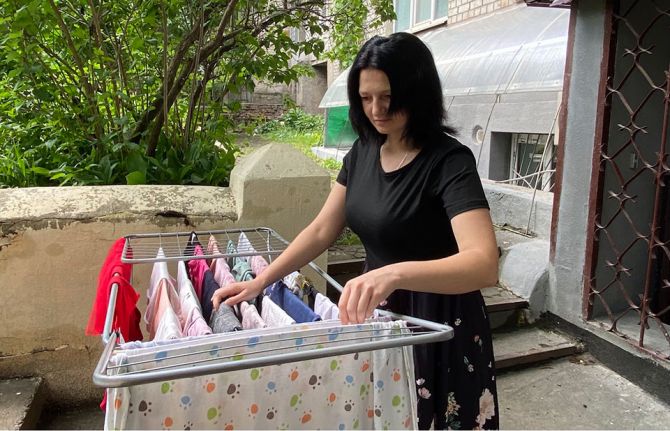

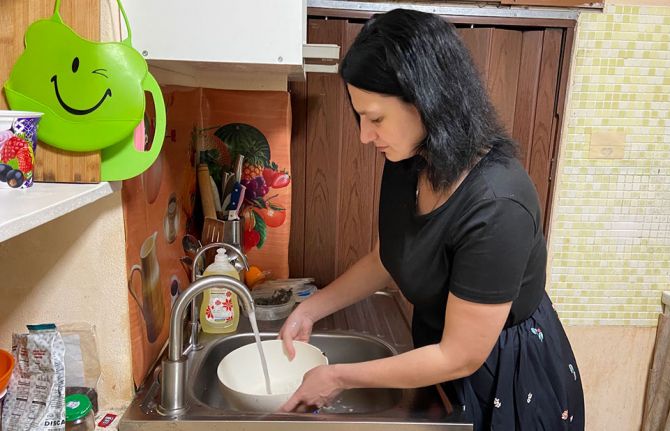
Feature Story
Women, HIV, and war: a triple burden
12 September 2025
12 September 2025 12 September 2025Lidiia comes from the Zaporizhzhia region, just steps away from Ukraine’s front line. After the full-scale invasion in 2022, her village fell under occupation. She lived in uncertainty for several long months.
“Staying there was unbearable — especially for women. It was constant fear — a nightmare,” she said. “The humanitarian situation was dire: aid vehicles couldn’t reach us, and some were simply shot at.”
Cut off from humanitarian assistance, Lidiia struggled to find basic supplies — food and hygiene products for herself and her young daughter. Most critical for her was not knowing where she could get her supply of antiretroviral therapy for HIV. People living with HIV take a daily pill to keep the virus at bay.
When medicine shortages reached a critical point, she fled her village. Before the war, the road to the eastern city of Dnipro took just three hours; this time, it took three days. Lidiia carried her baby daughter in her arms while pregnant with her son. Exhausted, she had no clear destination.
After days of uncertainty they reached Dnipro, where they found shelter run by the community-based organization “100% Life. Dnipro”. This safe haven welcomes primarily displaced people living with HIV or at high risk of infection, with a special focus on women and mothers with children. The shelters opened as part of the UNAIDS Emergency Fund 2022-2024 thanks to donor support. This shelter is among three in the Dnipropetrovsk region. They offer housing, food, hygiene products, and access to antenatal, pediatric, and HIV care. For mothers like Lidiia, it is not just shelter — it is a lifeline.
“I’m grateful we’re safe,” she said three years after arriving there. “But I still dream of going home — of walking through our front door again and knowing the war is over.”
According to UNHCR, 3.7 million people remain internally displaced within Ukraine, while another 6.9 million have sought refuge abroad. A large proportion are women and children, including many living with HIV and other vulnerable groups. Community-led research by community organisation, “Positive Women”, supported by UNAIDS and UN Women, surveyed 320 women living with HIV across Ukraine in late 2023–early 2024. It confirmed that women living with HIV are facing a triple burden: displacement, gender-based violence, and barriers in access to essential health services.
More than 70% of respondents reported worsening household economic well-being, and over a third lost property. One in six lost their jobs or businesses. Many women described being unable to meet even the most basic needs for themselves and their children. Barriers to health care have also increased as the war drags on. A third of women reported greater difficulties in reaching HIV services due to destroyed infrastructure, insecurity, or lack of resources. Women also reported high levels of anxiety, depression, and post-traumatic stress, compounded by caregiving responsibilities and separation from family.
Despite this, most managed to continue their life-saving medicine thanks to emergency distribution and community support.
For many this is a testament to the resilience of Ukraine’s health system and its civil society.
“The resilience of women like Lidiia, together with the findings of community-led research, highlight both the urgency and the possibility of action,” said Gabriela Ionascu, UNAIDS Country Director for Ukraine.“With sustained international support, community engagement, and rights-based approaches, access to vital services can be preserved—even in the most challenging of times.”


